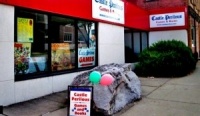 Rolling for Initiative is a weekly column by Scott Thorne, PhD, owner of Castle Perilous Games & Books in Carbondale, Illinois and instructor in marketing at Southeast Missouri State University. This week, Thorne uses his experience as a University professor to explain a strategy for successful retailing.
Rolling for Initiative is a weekly column by Scott Thorne, PhD, owner of Castle Perilous Games & Books in Carbondale, Illinois and instructor in marketing at Southeast Missouri State University. This week, Thorne uses his experience as a University professor to explain a strategy for successful retailing.As you may or may not know, I teach a course in retailing at Southeast Missouri State University in Cape Girardeau, Missouri. One of the classes I get to teach every year is Retail Management. This year, we are using the text Retailing (catchy name, that) by Dunne, Lusch and Carver and the authors point out that successful retailers follow a fairly straightforward three step strategy (the strategy is straightforward, the tactics needed to implement it can get quite complex and time consuming).
1. Get shoppers into your store (or onto your website). This is the basic purpose of sales promotion, advertising and public relations, all components of promotion. They get the word out about your store, creating interest in potential shoppers and driving them into your store. The problem with these forms of promotion is that games stores (and comic shops, for that matter) appeal to a very niche market. Almost everybody uses toothpaste and laundry detergent, a comparatively tiny segment of the population plays Magic: The Gathering or Settlers of Catan and there isn't much in the way of mass media that reaches them easily, at least not in any form that is not prohibitively expensive for all but the top grossing stores. Most stores find word of mouth their most effective way of bringing in new shoppers and, of course, word of mouth is one form of public relations.
2. Convert shoppers into customers. This is where personal selling, the fourth component of promotion, comes into play. The other three forms of promotion serve to inform shoppers and get them to the store, personal selling gets them to buy the product. Some may need lots of personal attention, others only a little. Part of the training you should give your sales people (or realize yourself, if you are the only person on the staff) is how to recognize how much attention each shopper needs to turn them into a customer. You have a destination store. Shoppers don't come into it if they are not at least slightly interested in the products you have to offer. The higher your conversion rate (percentage of shoppers that become buyers) gets, the more money hits your bottom line.
3. Lower your cost of doing business as much as possible, while remaining consistent with the level of quality of product and service you desire to offer. Set the image of the store you wish to present the customer and determine how much you will have to spend in order to maintain that image. There is nothing wrong with having a store with dusty shelves and faded posters in the window, as long as that is the image you have decided you want to deliver to shoppers. As more stores upgrade their fixtures and appearance, such stores will likely become outliers, serving current customers but not developing new ones. When deciding on a fixture upgrade,
product line expansion or service enhancement, to remain successful, it is important to do so at the lowest cost possible, consistent with the image you want. Lowest cost does not mean cheap but it does mean cheapest. If I want a custom mural painted on my wall, and such work is consistent with my image, that's great. I still should negotiate the lowest cost possible to do so.
Following these three steps will make your store successful. This is a strategy though and should serve as guidelines on how to be a successful retailer. I have said nothing about the tactics you would need to develop and implement in order to carry the above strategy out. Knowing what to do is easy. Knowing how to do it, that's the hard part.
The opinions expressed in this column are solely those of the writer, and do not necessarily reflct the views of the editorial staff of ICv2.com.


